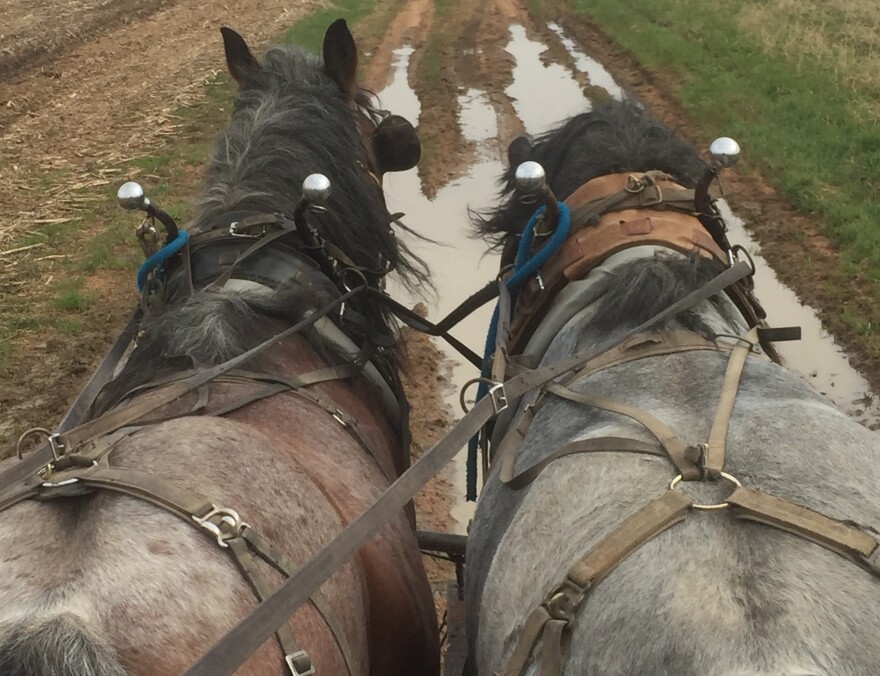It's been decades since trucks, tractors and other motorized equipment took over much of the work that horses once performed in farmers' fields. But a growing number of people around the country are returning to draft horses for plowing and other operations.
That's often in addition to using gas-powered vehicles, Joe Mischka says. He's publisher and editor of Rural Heritage magazine.
"There's a lot of movements that are converging to make people interested in using draft animal power: organic farming, sustainable agriculture, eating locally grown food. One of them is the ecological benefits. Horses have a much smaller carbon footprint," Mischka says.
Draft horses also can get in and out of spaces some vehicles can't because the animals are both sure-footed and lightweight, compared to trucks or tractors. For instance, the horses can traverse roads that are snow-covered, muddy or flooded.
Because of their agility, Wisconsin farmer Jason Julian is able to use horses in his wintertime logging business, Legacy Horse Logging.
It's also the reason the logistics company CH Coakley hired Julian earlier this year to deliver freight in northern and central Wisconsin. CH Coakley needed to get boxes of gear to cell phone towers for a big U.S. Cellular service upgrade. Trucks and ATVs couldn't get through to some of the towers because the primitive access roads were covered with deep snow, or had turned to muck, because of heavy spring rains.

Julian says he's delivered supplies for the upgrades to a few dozen sites. Sometimes he's made multiple trips to the same cell tower. He uses his pickup truck to haul the horses in a trailer, while his wife or mom follows in a second pickup, which is hauling a wagon. They pull over on a highway near a cell tower's access road and wait for the CH Coakley truck to drive up. Together, Julian and the delivery drivers determine whether the delivery truck can get through on the access road, or if the horses will be needed.
"You start gaining confidence because you've been to these sites more than once, and pretty soon you almost know which ones you need the horses for and which ones you won't need the horses for," Julian says.
LISTEN: How Draft Horses Are Helping Upgrade Cell Towers In Wisconsin
Julian says during winter snowstorms, it was clear his draft horses would have to get the job done.
"We got caught in a couple snowstorms some days and we delivered freight all day, and it was six inches of snow on the roads. They were terrible snowstorms," he says.
Julian has been working with draft horses for years. He says their breed, the Belgian Brabant, is a type of horse that was common on farms here in the 1800s. "These European Belgians, they are the old, original style Belgians. They're short-backed, heavily muscled, they're easy keepers, very calm minded, very easy horses to be around, very easy horses to train."
Julian raises and trains the horses to work in the fields at the Julian Dairy Farm in Medford, WI. It's an organic, family-run operation, which Julian owns along with his wife Katrina. Their three sons help out with chores before and after school. Julian says every time his family members lead the horses to water or to the pasture, the humans teach commands to the animals. The work starts when the horses are very young, and helps establish an important bond between the people and the animals.
"There's a lot of people that enjoy horses and have a weekend horse, go riding here or there. There's not a lot of people that make a living with them. And when you start making a living with your horses, they have to be able to work. They have to trust you. You have to be able to trust them. It's just the next level," Julian says.
Julian says he adds commands as the horses get older, and by the time they're two years old, he attaches them to a wagon or a plow, just so they can get the feel of it. When they're three, he has the horses spend more time pulling, but keeps the loads light. When the horses are four years old, he says they're not fully mature, yet they're close enough that they can work alongside him in the fields and forests.

He's not alone in doing specialized work with draft horses. Julian says he knows of people around the country who've taken on similar jobs. "I have a friend that does sensitive beach areas up by Ashland and Hayward where they can't take machinery down by the beach. And he cleans up their beaches and does work by the lakeshore with horses. There's lots of jobs these horses could fill."
Yet Julian says the work isn't for every animal or handler. He says you have to know exactly how much your horses can haul -- and for how long -- in order to keep them healthy. He says it takes years of practice, to confidently drive a team in unpredictable settings. Take logging, for instance.
"Logging is inherently dangerous. Now we're going to throw in an animal with his own mind and his own ideas and maybe his own fears, and you made it exponentially more dangerous. You better be rock solid with your animals. Your yes better be yes, and your no better be no. When you say whoa, that better be instant, and that horse better stand there and wait on you until you're ready to go again," Julian says.























